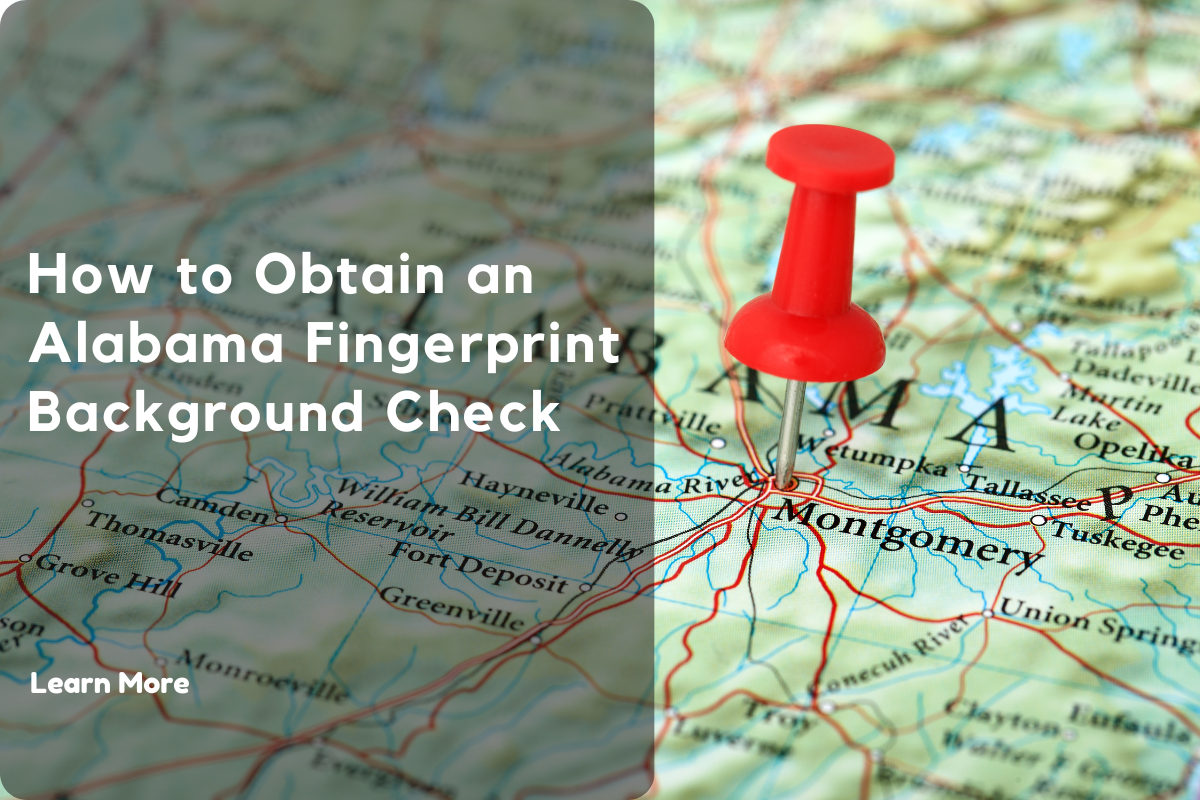 What is a Fingerprint Background Check?
What is a Fingerprint Background Check?
A fingerprint background check is a security measure designed to provide an accurate and detailed record of an individual’s criminal history. This method of background screening relies on an individual’s fingerprints, which are collected and sent to law enforcement agencies for comparison against criminal databases. The goal of this process is to detect any criminal activity associated with that person, including felonies, misdemeanors, and arrests.
Fingerprint background checks are considered far more reliable than name-based checks, which are based on personal identifying information such as a person’s name, date of birth, and social security number. Name-based checks can be prone to errors because common names or incorrect personal information can result in mismatches. Fingerprint checks, on the other hand, provide a more accurate way of identifying individuals because fingerprints are unique to each person. Even identical twins, who share the same DNA, have distinct fingerprints.
In Alabama, fingerprint background checks are mandated for various sectors to ensure the safety of individuals and prevent the hiring of individuals with a criminal history, especially in sensitive industries such as healthcare, education, and law enforcement. Unlike other forms of background checks, fingerprints allow agencies to match records more effectively by using biometric data, making the process more reliable and comprehensive.
Why Are Fingerprint Background Checks Required in Alabama?
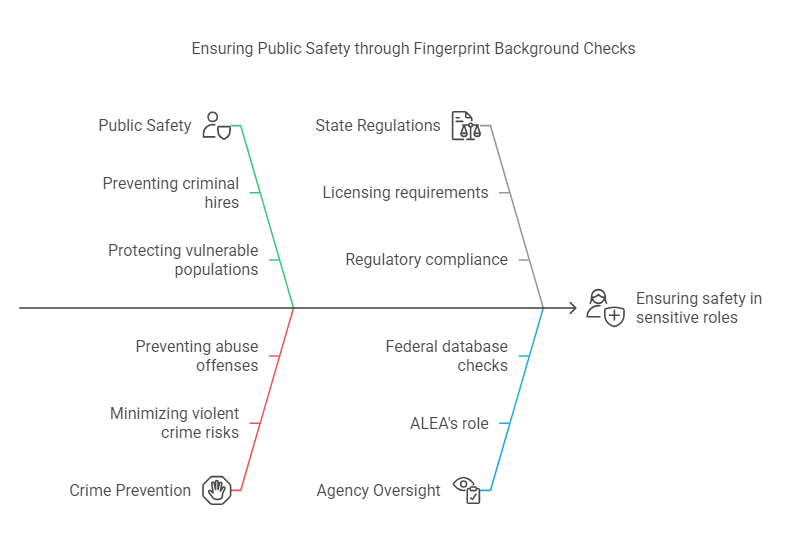
In Alabama, fingerprint background checks are required for positions that involve working with vulnerable populations, such as children, the elderly, or individuals with disabilities. These checks help prevent hiring individuals who may have a history of criminal behavior, particularly in sensitive roles where safety is paramount. Fingerprinting is essential for maintaining public safety, which is why it is often a legal requirement for certain industries.
Public Safety & Crime Prevention
The primary purpose of fingerprint background checks is to ensure that individuals with criminal histories, especially those involving violent crimes or offenses related to abuse, are not placed in positions where they might harm vulnerable individuals. Positions in education, healthcare, and childcare often require fingerprint background checks to minimize the risk of criminal activities affecting students, patients, and children.
For example, in Alabama, public schools and childcare centers are required by law to conduct fingerprint background checks on employees and volunteers to ensure that no one with a criminal history that poses a threat to children is allowed to work in those environments. This ensures that the safety of students and children is prioritized in these settings.
Healthcare facilities, particularly those providing long-term care or working with elderly populations, also conduct fingerprint background checks on staff. This is to guarantee that those responsible for the care of vulnerable patients do not have a history of criminal behavior that could compromise patient safety.
State Regulations
Alabama has strict regulations governing the use of fingerprint background checks, particularly for public safety and occupational licensing. Certain jobs in the state require individuals to undergo a fingerprint background check as part of the licensing process or before beginning employment. These checks are mandated by state law to protect both employers and individuals who work in positions that could expose them to significant risk if the wrong person is hired.
The Alabama Law Enforcement Agency (ALEA) is responsible for overseeing and managing the fingerprinting process, ensuring that fingerprint background checks are conducted in accordance with state and federal regulations. The agency is tasked with scanning the fingerprints of applicants and comparing them against Alabama’s criminal records database. The checks can also be extended to federal databases, such as the FBI’s National Criminal Background Check System (NCIC), which provides a broader scope by considering criminal records from across the United States.
In addition to mandatory fingerprint checks for certain jobs, Alabama also has specific licensing boards for sectors such as healthcare and law enforcement that require fingerprinting as part of the credentialing process. These checks are necessary for both new applicants and those seeking to renew or maintain their professional licenses.
How Does a Fingerprint Background Check Work in Alabama?
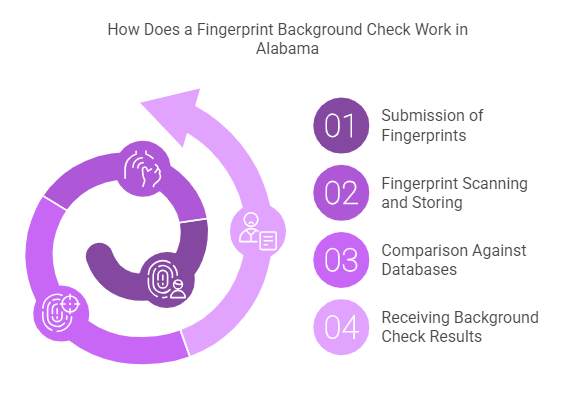
The process of obtaining a fingerprint background check in Alabama is straightforward, but it involves several key steps to ensure accuracy and compliance with the state’s legal requirements. Below, we provide a step-by-step breakdown of how the fingerprinting and background check process works in Alabama.
Step 1: Submission of Fingerprints to the Alabama Law Enforcement Agency (ALEA)
The first step in obtaining a fingerprint background check is submitting fingerprints to the Alabama Law Enforcement Agency (ALEA). This can be done at an ALEA-approved fingerprinting site, which may include government-run offices or certified private vendors. The individual seeking the background check must visit one of these locations to have their fingerprints taken. They may be taken electronically using a live-scan fingerprinting machine, or manually on a fingerprint card, which is then sent to ALEA for processing.
Before getting fingerprinted, individuals are typically required to provide valid identification to verify their identity. The most common forms of identification include government-issued IDs like a driver’s license, state ID, or passport.
Step 2: Fingerprint Scanning, Storing, and Comparison
After the fingerprints are captured, they are sent to ALEA’s Criminal Records Division, where the fingerprints are scanned into their database and compared against both state and national criminal databases. ALEA uses advanced technology to analyze and match the fingerprints against criminal records, including both felony convictions and misdemeanor offenses. The system checks these records for any criminal activity that matches the fingerprints provided.
This comparison process allows ALEA to verify the individual’s criminal history by matching the scanned fingerprints with records stored in Alabama’s criminal database and the FBI’s National Criminal Background Check System (NCIC), which includes federal criminal records. It is at this stage where discrepancies, matches, and potential criminal history are flagged, and the results are compiled into a report.
Step 3: Receiving the Results of the Background Check
Once the fingerprinting and comparison process is complete, ALEA generates a report detailing any criminal history associated with the individual’s fingerprints. The background check report will contain information such as:
- Felony convictions (both state and federal)
- Misdemeanor convictions
- Pending charges
- Arrests (if applicable)
The background check results are sent to the individual or the requesting agency, typically within 3 to 10 business days depending on the volume of requests and whether expedited services are requested. Some employers or industries may also receive a copy of the report for employment or licensing purposes.
Types of Background Checks in Alabama
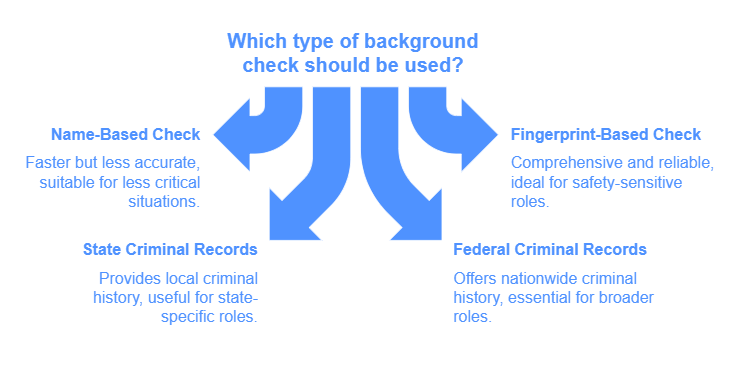
There are various types of background checks that can be used in Alabama, and each serves a different purpose. Here’s an overview of the most common types:
- Name-Based Background Checks: A name-based check is a simpler and more basic type of background check that compares an individual’s name and other identifying information to criminal databases. While this method is faster, it is not as accurate as fingerprint checks, as there may be multiple individuals with similar names or birth dates, leading to potential mismatches.
- Fingerprint-Based Background Checks: Fingerprint checks are the most comprehensive and reliable form of background check. They eliminate the potential for confusion due to name similarities or misidentification and are the preferred choice for employers and regulatory bodies, especially when safety is a primary concern.
- State vs. Federal Criminal Records: A state-level fingerprint check will provide information about criminal records within Alabama, while a federal-level check provides information about any criminal history within the United States. Employers or organizations may require both state and federal checks depending on the type of job or role the individual is applying for.
Fingerprint-based background checks are regarded as the most reliable method for identifying an individual’s criminal history, ensuring that employers and agencies make informed decisions when hiring, licensing, or granting access to sensitive positions.
The Alabama fingerprint background check process plays a critical role in safeguarding public safety and ensuring that individuals are thoroughly screened before being hired or licensed in sensitive sectors. It provides a more accurate, secure, and legally compliant way to verify criminal histories, especially when compared to name-based checks. In the next section, we will look into the specifics of obtaining a fingerprint background check, including costs, processing times, and where to get fingerprinted in Alabama.
The Process of Obtaining a Fingerprint Background Check in Alabama
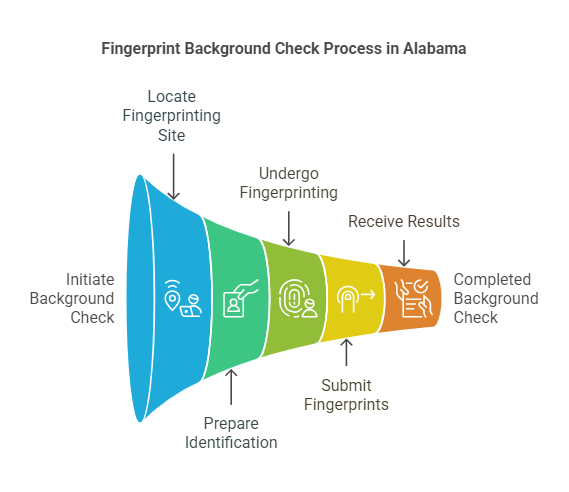
Obtaining a fingerprint background check in Alabama is a methodical and standardized process, ensuring that both individuals and organizations can verify criminal histories accurately and efficiently. Understanding the steps involved, from fingerprint submission to receiving the results, is crucial for anyone needing a background check for employment, licensing, or other purposes.
Step 1: Finding a Location for Fingerprinting
The first step in the process is finding an authorized location to get fingerprints taken. In Alabama, you have a few different options for getting fingerprinted, depending on your location and convenience:
- Alabama Law Enforcement Agency (ALEA): The Alabama Law Enforcement Agency (ALEA) operates fingerprinting services directly through its facilities, which are strategically located across the state. ALEA ensures that fingerprinting is done in compliance with state regulations, making it the go-to choice for many individuals.
- ALEA-Approved Private Vendors: In addition to ALEA facilities, there are certified private vendors in Alabama that are approved by ALEA to conduct fingerprinting. These private vendors may be more accessible in rural areas or for individuals who are unable to visit ALEA locations due to geographic or scheduling challenges. These vendors typically use live-scan technology, which enables faster and more efficient collection of fingerprints.
- Employer-Specific Locations: In certain situations, employers or organizations may have an arrangement with fingerprinting providers, and applicants or employees may be asked to visit a designated fingerprinting location.
Before visiting any fingerprinting site, individuals must verify the location’s approval status with ALEA to ensure the fingerprints are valid for background check processing.
Step 2: Required Identification and Documents
To initiate the fingerprinting process, individuals must bring valid identification to verify their identity. The types of identification accepted typically include:
- State-issued driver’s license
- State-issued ID card
- Passport
- Military ID
In addition to identification, individuals may need to provide specific documentation depending on the reason for the background check. For example, if the check is for employment, the employer may supply instructions or forms related to the fingerprinting process. If the background check is for licensing purposes (e.g., for healthcare professionals), applicants may need to provide additional paperwork or application details.
It’s important to double-check the specific requirements for the fingerprint background check before visiting the fingerprinting location to avoid delays or complications.
Step 3: Fingerprinting Process
When arriving at the fingerprinting location, individuals will undergo the actual process of having their fingerprints captured. The most common method for fingerprinting in Alabama is live-scan, a digital fingerprinting system that scans and records fingerprints directly into a computer system. Live-scan technology has several advantages, including:
- Efficiency: The process is quick and does not require ink or paper.
- Accuracy: The digital system ensures accurate capture and transfer of the fingerprints.
- Transmission: Fingerprints are directly transmitted to ALEA or the required agencies, reducing errors and speeding up the processing time.
For those who cannot use live-scan systems, ink-based fingerprint cards are an alternative, though this method is less commonly used.
The fingerprinting session itself typically takes only 10 to 15 minutes, but applicants may need to wait for their turn, depending on the volume of other individuals at the location.
Step 4: Processing the Fingerprints and Receiving Results
After fingerprints are collected, the next step involves sending the scanned or inked fingerprints to ALEA for processing. ALEA will compare the submitted fingerprints against its criminal records database, and in some cases, the FBI’s National Criminal Background Check System (NCIC) for federal-level criminal records.
The processing time for Alabama fingerprint background checks can vary, but typically, results are available within 3 to 10 business days. Expedited services may be available for an additional fee, allowing individuals or organizations to receive results more quickly.
Once the fingerprints are processed, ALEA will generate a background check report, which will be sent to the individual or the requesting organization. This report will detail any criminal history, including felony convictions, misdemeanor charges, pending charges, and arrest records. It is essential to carefully review this report, especially if it is being used for employment or licensing decisions, as any errors or discrepancies could impact the outcome of an application.
Cost of Alabama Fingerprint Background Checks
The cost of obtaining a fingerprint background check in Alabama depends on several factors, including the type of fingerprinting service, the agency or vendor used, and whether expedited processing is requested. Understanding the cost structure can help both individuals and organizations budget for the fingerprinting process.
Basic Fees for Fingerprint Background Checks
The basic cost of fingerprint background checks in Alabama typically ranges between $30 and $50 for standard services. This fee covers the actual fingerprinting service and the transmission of fingerprints to ALEA for processing. In some cases, these costs may be higher depending on the complexity of the background check, the number of records searched, or other factors.
Expedited Processing Fees
If you need the results of a fingerprint background check urgently, expedited processing services are often available. The cost for expedited services generally adds $15 to $25 to the total cost of the fingerprinting. This service ensures that you receive your results more quickly—often within 48 hours—depending on the vendor or ALEA processing times.
Additional Fees and Costs
Several other factors can influence the total cost of a fingerprint background check in Alabama:
- Vendor Fees: Some third-party fingerprinting vendors charge additional service fees beyond the base cost of fingerprint collection. These fees may cover things like administrative costs, the use of specialized equipment, or the handling of paperwork.
- Multiple Background Checks: If an individual or organization needs to request multiple background checks, additional charges may apply. For example, if both state and federal background checks are required, there may be separate fees for each.
- License-Specific Fees: Individuals applying for certain professional licenses may encounter additional fees set by licensing boards or agencies. These fees are often separate from the fingerprinting and background check costs but are part of the overall screening process.
Factors That Affect the Cost of Fingerprint Background Checks
There are several factors that can impact the cost of fingerprint background checks in Alabama. These include:
- Type of Employment or Licensing: Different employers and licensing boards may have varying requirements for fingerprint background checks, which can affect the cost. For example, positions in healthcare or law enforcement may require more comprehensive checks, resulting in higher fees.
- Third-Party Vendors: Some third-party vendors may charge additional service fees for fingerprinting services, which could include administrative charges, travel expenses (if on-site fingerprinting is offered), or the use of specialized equipment.
- Urgency of the Check: If you need expedited results, this will come at an additional cost. Expedited fingerprinting services ensure that the report is processed and delivered much faster than standard services.
How to Get Fingerprinted in Alabama
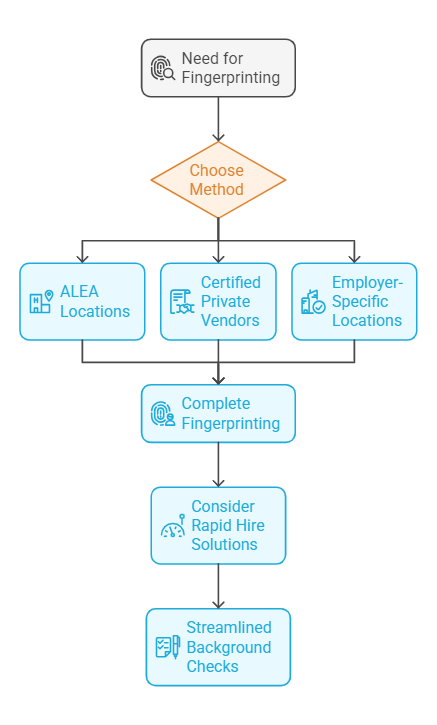
In Alabama, there are several ways to get fingerprinted for a background check. As previously discussed, these options include:
- ALEA Fingerprinting Locations: Individuals can visit ALEA’s designated fingerprinting sites across Alabama. ALEA offices are staffed with trained personnel who can assist with the fingerprinting process, ensuring compliance with state regulations.
- Certified Private Vendors: Private vendors approved by ALEA are available throughout the state and offer fingerprinting services using live-scan technology. These vendors often operate in areas where ALEA offices may not be easily accessible, making them a popular choice for many individuals.
- Employer-Specific Locations: Employers or organizations requiring fingerprint background checks may set up designated fingerprinting sessions at specific locations. These sessions may be more convenient for employees and applicants, especially if the employer works with a third-party fingerprinting provider.
As with any fingerprinting service, it’s essential to check that the location is ALEA-approved to avoid any issues with the validity of the background check.
Reliable Fingerprint Background Check Services with Rapid Hire Solutions
For businesses and individuals in Alabama needing efficient and reliable fingerprint background checks, Rapid Hire Solutions offers comprehensive screening services. Their platform helps businesses streamline the background check process, ensuring compliance with both state and federal regulations. With a focus on minimizing costs and improving efficiency, Rapid Hire Solutions provides a seamless experience for employers, offering a wide range of background check options including fingerprinting, and helping organizations meet their regulatory obligations. Whether you need pre-employment screenings or ongoing background checks, their team can assist in delivering accurate and timely results.
Legal Aspects of Fingerprint Background Checks in Alabama
Fingerprint background checks in Alabama are governed by both state and federal laws that regulate how criminal history information can be used in employment and licensing decisions. These laws aim to protect individuals’ privacy while ensuring that employers and licensing authorities can make informed decisions about hiring or granting licenses. In this section, we will explore the legal considerations, including state-specific laws, federal regulations, and the rights of individuals undergoing a fingerprint background check.
State Laws Governing Fingerprint Background Checks
In Alabama, there are several laws that mandate the use of fingerprint background checks for specific employment positions and licensing requirements. Some of the most notable state laws include:
- Alabama Criminal History Background Check Act: This law establishes the procedure for conducting criminal history background checks in Alabama, including the collection of fingerprints. It outlines the role of the Alabama Law Enforcement Agency (ALEA) in processing fingerprint background checks and ensures that certain employers, especially those in sensitive fields, must conduct these checks as part of the hiring process.
- State-Specific Regulations: Many state regulations require fingerprint checks for specific professions, including healthcare workers, educators, childcare providers, and law enforcement personnel. For example, the Alabama Department of Public Health mandates fingerprint background checks for healthcare professionals seeking licensure. Likewise, individuals seeking jobs in schools or daycare centers are often required to submit fingerprints for screening to ensure the safety of children.
- Ban the Box: Alabama law includes provisions related to the “ban the box” initiative, which is designed to prevent employers from inquiring about criminal records too early in the hiring process. While fingerprint checks are still required for certain positions, this law aims to ensure that employers do not automatically disqualify applicants based on criminal history without considering other qualifications. However, certain industries, like education or healthcare, may have exemptions that still require criminal background checks as a first step in the application process.
Federal Regulations and Fingerprint Background Checks
In addition to state laws, federal regulations also govern how fingerprint background checks can be used, particularly in employment situations. Some key regulations include:
- The Fair Credit Reporting Act (FCRA): The FCRA governs the use of consumer reports, including criminal background checks, for employment purposes. Under this act, employers must obtain written consent from individuals before conducting a background check. They must also inform candidates if they plan to take any adverse action (e.g., not hiring) based on the results of the background check. The FCRA mandates that employers provide individuals with a copy of the report if the report is used to make a negative employment decision.
- The Equal Employment Opportunity Commission (EEOC) Guidelines: The EEOC enforces federal laws that prohibit employment discrimination. When using fingerprint background checks, employers must ensure they do not discriminate against candidates based on race, color, national origin, sex, or disability. The EEOC has issued guidelines on how employers should consider criminal records in hiring decisions, emphasizing that an arrest record alone is not sufficient grounds to disqualify a candidate. Employers should also consider the nature of the offense, how long ago it occurred, and whether it is relevant to the job in question.
- The National Instant Criminal Background Check System (NICS): For certain positions, especially those related to firearms or security, individuals may be required to submit fingerprints for inclusion in the NICS. This federal system allows agencies to conduct a quick background check on individuals seeking to purchase firearms or secure positions requiring access to weapons.
What Happens if a Criminal Record is Found on a Fingerprint Background Check?
If a criminal record is found during a fingerprint background check, the individual will typically be notified of the results. For employment purposes, the employer may decide to move forward with the hiring process, delay a decision, or disqualify the candidate based on the findings. However, it’s essential to note that employers must follow the laws governing the use of criminal history in employment decisions.
Legal Rights of Individuals Undergoing a Fingerprint Background Check
Individuals undergoing fingerprint background checks have certain legal protections:
- Right to Consent: Before a background check is conducted, employers or licensing agencies must obtain written consent from the individual.
- Right to Be Informed: If an individual is denied employment or a license due to a criminal record, they must be informed of the reason for the decision. The employer must provide a copy of the background check report if it is the reason for the denial.
- Right to Dispute Errors: If there are errors on a background check, such as incorrect criminal records or mismatched fingerprints, individuals have the right to dispute these errors with ALEA or the FBI. This may involve submitting additional documentation or going through a formal process to correct the record.
- Sealing or Expunging Criminal Records: In certain cases, individuals may have the option to have their criminal records sealed or expunged, meaning that the record will no longer appear on future background checks. However, not all criminal records are eligible for expungement, and specific legal procedures must be followed to request it.
FAQs: Frequently Asked Questions
What is the difference between a name-based background check and a fingerprint background check in Alabama?
A name-based background check is a search of criminal records using an individual's name and other identifying information. This type of check is generally less reliable because it is prone to errors or mismatches. In contrast, a fingerprint background check involves submitting an individual's fingerprints for comparison against criminal records, which is far more accurate and thorough in identifying the individual’s criminal history.
Can I request my own fingerprint background check in Alabama?
Yes, individuals can request their own fingerprint background check in Alabama. This is commonly done when an individual needs to check their own criminal record for accuracy or for personal reasons, such as when applying for a job or professional license.
How long does it take to get the results of a fingerprint background check in Alabama?
The results of a fingerprint background check in Alabama generally take between 3 to 10 business days to process. Expedited services are available for an additional fee, which can shorten the turnaround time to 48 hours.
Are there any situations where an individual may be exempt from fingerprinting for employment in Alabama?
In certain cases, individuals may be exempt from fingerprinting requirements, such as when applying for positions that do not involve working with vulnerable populations (e.g., children, the elderly) or when the job does not require a criminal background check by law. However, specific exemptions vary by industry and job type.
What happens if I have a criminal record on my fingerprint background check?
If you have a criminal record that appears on your fingerprint background check, the results will be reviewed by the employer or licensing authority. Depending on the nature of the offense and the job or position applied for, the employer or authority may decide to disqualify you, or they may consider the offense as part of the overall application. If the record is inaccurate or outdated, you have the right to dispute it.
Conclusion
Alabama’s fingerprint background check process plays a critical role in ensuring public safety and promoting transparency in employment and licensing decisions. By understanding the legal landscape, processing steps, and costs involved in obtaining a fingerprint background check, individuals and employers can ensure compliance with state and federal laws. For businesses and organizations seeking to streamline the process and maintain regulatory compliance, services like those offered by Rapid Hire Solutions can provide valuable support.
